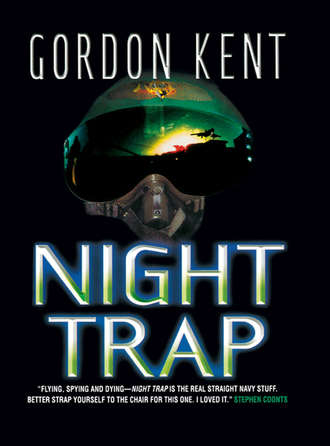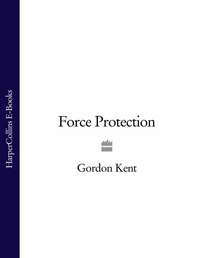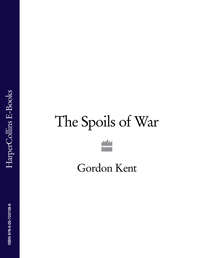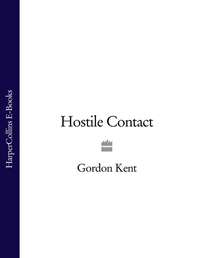
Полная версия
Night Trap
It had gone on within seconds of the feet-dry time and within four miles of the northern target group’s route. It must have seen the whole northern strike package. Alan dialed up Strike Common, the radio frequency on which most chatter would occur when EMCON was dropped.
“Touchdown,” a voice in his helmet said. EMCON was over.
“Packers!” another voice cried, and the plane seemed to drop out from under him.
Packers were unfriendly aircraft that had leaked through the forward screen. To four men riding a big, fat grape, the word meant danger. Alan had a brief recall of an argument in CVIC about whether the tankers would be too close to the coast. We are, we are.
Rafe had the plane in a dive for the surface.
Alan punched up his datalink display. Christine gave a faint whine.
The display died.
“Shit, Senior! We lost the back end,” Alan groaned. Without conscious thought, he reached up, toggled the system switch off, counted ten, and toggled it on again.
Christine continued to dive.
As Alan tried to urge a glimmer from Christine’s brain, he checked and rechecked the chaff and flare counters above his head.
“Dumped the load,” he said into the mike. His anxiety showed in his voice. When you do a cold dump in an S-3 you lose a lot—not least the ability to see if the Packer is after you.
Rafe came on the line. He had long since got his confidence back after the double bolter, and four months of flying had made his decisions crisper. He was busy just then, but this was what he was trained for, no bullshit, just flying. “Masks on. Spy, get that fucking computer up and tell me what’s happening. Chaff and flare are armed.”
Alan reached up and fired a chaff/flare sequence. The numbers counted down; three chaff, two flares down, plenty to go. “Chaff/flare checks good, Senior’s got a reinit.” Alan’s fingers flew. He input the vital data—targets and known SAM sites—while Senior struggled to restore the datalink. Alan had to reinput his hotlist of radar contacts. When he hit the input button he saw that Senior had the datalink back up—and the news was bad.
Senior Chief Craw was drawling into the headset, “One bandit southeast nineteen NM and heading right at us. About 540 knots.”
“Spy! What is it? MiG-29?”
If it is we’re dead, he thought. Where the hell is our CAP? We had an F-14 out here ten minutes ago; his wingman had a hydraulics failure, but—
Alan found their missing CAP just as Narc did. “Fucking REO!” Narc shouted. Their protection had done his job and made a run at the intruder, but a nervous NFO and an inexperienced pilot had ended in a missed intercept and a bad shot. Narc had their Fighter Common on his comm and was trying to get the Tomcat back.
The intruder continued to bear down on them.
Why didn’t he turn and engage the Tomcat? He didn’t even seem to know that the fighter was there. Alan looked at his datalink and got a radar cut that ran like a sword through the unid box. The cut was rare; in effect, it was unknown, not present in the laundry list of radars and attached planes flown by threat countries. His head, however, unlike the datalink, was stuffed with such unconsidered trifles: he knew what it was.
“Chinese-built A-5 Fantan! Two Atoll AA missiles, shitty little radar. Rafe, get below eight hundred feet and he can’t get a tone with his birds.”
Rafe liked knowledge. He also liked certainty, and Alan sounded absolutely certain. And it was better than nice that it was a third-world pilot in a first-generation piece of shit chasing him, not some Russian mere in a MiG-29—an F-18 in drag—looking for a score.
“Okay, got it, we’re going through two thousand and I’d really like to know his stall speed and has he got a gun?”
Alan had his kneeboard packet open and the A-5 card was glaring at him, printed for some reason on fluorescent orange card stock. “Two 20-millimeters. 165 knots clean. Worse for this guy, he’s got to have a drop.”
He looked at the screen; Christ he’s close, Alan thought, and all hell broke loose.
“Chaff flare!” shouted Narc, and he fired the sequence himself from the front. Narc’s RAW gear showed a launch somewhere behind him. Alan leaned forward against the power of the dive and tried to read their altitude. “Below 1000!” he said, and Rafe pulled hard to the right, worse than the hardest break Alan had ever seen, and moonlit sea reached up hungrily toward the Senior’s porthole to pull Christine down. The altimeter was now at two hundred feet: Christine did not believe in registering lower altitudes. Alan forced his arm up against the G force and put the chaff on automatic. He suddenly didn’t trust all the data ingested at intel school. Had anybody ever actually fought an A-5? Fuck, what if all the intelligence was bullshit? Wasn’t that the point Peretz had tried to make to him?
Rafe rolled the plane 180 degrees and started a more comfortable turn. A flash went by Alan’s porthole. “Missiles timed out,” Alan said, mostly sure that he was right. Craw was shouting on Strike Common, but nobody was going to save them; they were too far from the strike package and too far from the ship. In five minutes, every Tomcat and Hornet in naval aviation would be crisscrossing this airspace in search of air medals, but five minutes is an age in aerial combat and this was now.
“He’s on top of us,” Alan said.
Christine bucked savagely. He felt a slap at his left elbow, and a star-edged hole appeared in the windscreen.
They knew Christine had been hit by the 20-millimeter. They felt the rounds go into her and waited for disaster; at two hundred feet, any glitch and they were dead.
Rafe tightened his turn and dumped more speed. Christine was such a peculiar bird, he muttered, that he swore she flew better with the damage. “Nice shooting, Tex,” Rafe murmured, and he eased off on the speed again and Christine was almost standing still in the air.
The last chaff pod emptied with a clunk. Another round hit Christine’s wing and she started to leak fuel and pull to the right. The airspeed indicator registered 165. Rafe tilted the wings savagely and suddenly tightened his turn. His crew could not see the death’s-head grin that clutched his face, an expression of vengeance and anguished hope and a desperate anxiety that came from seeing the whitecaps, not so much below his window as next to it. He was muttering a fat-grape pilot’s prayer: Follow me, you mother, follow me, down and around and down and—
A brief, violent flare lit the rearview mirror.
The silence of the cockpit seemed so profound to Alan that the whistle of air through the hole in the canopy was somehow outside it. He saw Christine’s interior with unearthly clarity—Craw’s silhouette, the screens, the gleam of his thermos.
Then he knew they had levelled off and were starting to climb.
The radar cuts from the A-5’s gun were gone.
Abruptly, Rafe punched his fist into the air over his head and gave a whoop. “Gotcha!”
Then, calmly, into the mike, he drawled, “Guardian, this is Gatoraid 2, splash one bandit, over,” and he laughed. And laughed. “We got him. I mean, we fucking got him!” He couldn’t seem to stop laughing.
Later, when he would tell this story to explain his Air Medal, he would lay his hand flat on the table and he would say, “You want to know how low I was? I was so low—I was so low that they had to scrape barnacles off Christine at the next maintenance check.” And he would pause, and smile, and a little of this same delighted laughter would burble out. “And you wanta know how low that A-5 Fantan was? On the bottom, ba-bee!”
“That was beautiful!” Narc crowed. There was no fawning in his voice. “Fucking beautiful.”
“What happened?” Senior Chief Craw asked. “Tomcat get him?”
“Rafe fuckin’ dumped him in the water,” Narc said. Rafe had managed to stop laughing. “He just went lower and slower till the raghead stalled.”
Rafe chuckled—not the release of tension any more, just amusement. “We got a kill,” he murmured. “An S-3 got a kill!”
They all began to laugh. More, and louder, and then Alan was pounding on Craw’s shoulder, and he realized what they had done. Rafe’s flying, yes, but also his knowledge and Craw and Narc.
Christine climbed the night, bullet holes whistling, content that she had killed again.
2335 Zulu. The Gulf.
Strike Common was a tangle of voices. Southern Iran was covered in a net of radar cuts, AAA, and SAM radars coming on and off. The IADS had done well for the first few minutes; Alan had missed the climax, when their AAA and SAMs came online; but the HARMs and the jamming were beating them now. He saw no more hostile aircraft; their leaker had been a loony or a lone night patrol.
Millions of dollars were spent in seconds as he heard HARM shots called on Common and watched radar sites go off the air. Most of the strike package was still over the target, but some A-6s had already turned for home, and Alan found one only twenty miles southeast of them. He hooked it and found that it was limping along at only a thousand feet.
“What’s happening out there?” Rafe asked. He and Narc had assessed their damage and decided they could still give gas. That they were there, flying, doing routine, seemed an anticlimax; yet, astonishing as the attack and their survival had been, it was for the routine that they were there.
“We got one wounded bird coming in,” Alan said, “eighteen miles out and wrong IFF but he’s low and slow and on his radial. Try and raise him on Common. Maybe needs gas to land.”
Narc got the Hawkeye on comm. Alan’s guess was confirmed: northern strike lead in a wounded bird, thought he could land it, needed gas at a low altitude. Rafe nodded; after going almost underwater to down the Fantan, he figured he could give gas while taxiing, and Christine’s fuel leak didn’t worry him. They rogered up and turned southeast, headed to intercept.
Alan was entranced with the electronic images of the raid, rapt, watching the Iranian IADS fall apart. The target EW sites and their protective SAMs went down under the strike packages and did not come back up as the strike came off target. There was a two-hundred-mile gap in the IADS. If they could get a plane that far, Alan thought, the Bahrainis could bomb Tehran now.
“Hey, Spy, get the FLIR online. I want to know how bad off this guy is. He doesn’t have radio.”
The FLIR is an infrared camera for watching surface targets, particularly surfaced submarines, at night. Bored S-3 crews on training hops use it to watch junior fighter jocks make fools of themselves trying to get their fuel probes into the basket at the end of the refueling hose. Now, Alan switched to it from the raid with regret. He couldn’t watch the strike and FLIR at the same time; they both came up on the same screen.
Air-to-air refueling is an art at the best of times. Pilots try to perfect the technique against the day they really need the gas. Good aircrews practice no-comms refueling, using signals passed by flashlight and by aircraft lights. Yet, it is hard enough to maneuver a high-speed aircraft so that the attached fuel probe locks into the much slower tanker’s basket; with the plane damaged, the pilot injured, it becomes torture.
Rafe made a good rendezvous with the wounded aircraft, an A-6 with a gash up the starboard side that went right through the cockpit.
Narc said, “He’ll need about five thousand,” and started to work the refueling computer. “Spy, have I got a basket out there?”
Alan got the basket dead center in the FLIR. “Bigger than life.” He was still thinking of the raid. The urgency of the A-5 attack on them, the abrupt release, had left him unfocused.
He did not hear the change in Narc’s voice as he cut the lights and said, “Oh, shit.” Then, “He’s hit bad. Losing power.” His tone was odd, but Alan did not register it. Only later would he learn that both men in the front end had seen the injured aircraft’s side number and knew who it was.
Rafe growled, “Soon as he’s in the basket, we’ll descend a little, give him some more airspeed, start a slowwww turn toward the boat. We’ll get him home.”
Poor sonofabitch, he was thinking. He meant Alan, not the wounded pilot.
Alan saw an infrared image of the A-6 pull into his field of view and realized that it was missing part of its canopy. The shock of it pulled him from his apathy, and he thought, This guy is hurt bad, and he began to function again. He was so intent then trying to figure out if the BN was still in the cockpit that seconds passed before he caught the glow of the pilot’s helmet, the head bent far forward.
Volleyball net. A-6.
Dad.
The wounded bird plowed forward toward the basket but lost altitude. The probe missed, and the basket banged the A-6 windscreen. Invisible to Alan in the dark, Craw flipped on the camera attached to the FLIR.
Alan, cold, said, “He’s losing it. He can’t hold his altitude.” The A-6’s movements had a dreamlike quality now, too slow, silent, eerily altered by the FLIR’s infrared. It seemed impossible that he was watching his father try to save himself. It seemed impossible that they were not back on the carrier, the mission over. Where was routine?
Rafe took Christine into a shallow dive. He was sure he could still save this one, get him his gas, get them all home. Fourteen hundred feet now; he had almost a minute to get him in the basket. He crawled. Surely bad things could not happen now.
Alan watched his father try again. In the slow dive, he came on straight and sure, but fifty feet from the basket something happened and the A-6 gave a shudder and disappeared from the screen again.
Alan whirled the FLIR back and forth until he found the aircraft again, now off to the left and right wing high. Slowly he tracked its attempts to try another pass.
Closer.
Seconds passed. The A-6 got a lineup and came on.
The probe was out. Alan’s whole will tried to force the probe into the basket. The A-6 seemed to be flying through jelly, barely responsive, lazy. Slowly, slowly, the probe drifted closer.
Suddenly the probe was there there THERE and the basket sailed dead in front of it and it came on the last few feet and it was in.
“He’s in!” Alan shouted, and he heard Craw call something at the same time. He tried to relax his grip on the seat. It’s okay, he thought. It’s okay. Then, as the fuel hit the wounded bird, triumph faded.
Christine gave a shudder. They were four hundred feet off the water and the A-6 had pulled the basket right off the hose. Fuel was raining down to the dark water, falling like blood from an artery, like lost opportunities, lost hopes.
He thought the A-6 started to fall away then, and that would always be the image that he had of it—getting smaller, dropping slowly—but he would wonder later if that was only an image in his mind, the horror of a dream where the inevitable, the terrifying, takes form.
What Alan saw for sure, and knew he saw, knew that this really happened then, was his father raise his head and lift one hand in a gesture, half wave, half salute. Does he know it’s me? Does he know I’m here? Then the head went down and the A-6 dropped like a stone.
An ejection seat fired, and a second later the plane hit the water.
“He’s gone,” he heard himself say. “He’s gone.”
He flipped back to the datalink.
Christine was silent. Then Narc began to report the downed bird.
6
24 July 1990. 2123 Zulu. Florida.
Kim Hoyt had been doing small hits of coke since lunch and she wanted a party. It was pretty much a party already—her brother and two of his friends, her father, two business guys of his who had brought the coke as a sweetener for some deal they were making—but she wanted glitter and splash with it. She wanted to dress up and she wanted to strip naked; she wanted to be admired and she wanted to flirt; she wanted to be coveted and she wanted to be competed for. She wanted to be the center of something exciting, and that said to her a party.
Her father made deals. Mostly, his deals were in construction, condos and hotels, packaging and subcontracting, heavy in the part of the Cuban community where the money was. She admired her father. He was her model for a man: he could twist other men around each other, and he could make big money. Physically, he wasn’t much—paunchy and soft-looking, smooth, barbered—but she had already learned what a lot of young men didn’t know yet, that a middle-aged man like her father was more attractive than they were with their sunbleached hair and their muscles, because he gave off signs of power. If all you wanted was to get fucked, they were okay. “Put a sock in their mouth, they’re fine,” as she said to her friends. But she knew there was more to life than that. She knew that unless you wanted to be some overweight slob with cellulite and three kids and a mortgage, you wanted power and you wanted money.
So Kim loved her father. Almost beyond what was allowed, but they never crossed that line.
She lay by the pool, loving the coke, loving herself, the smooth honey of her skin, the reflection of herself in all the others’ eyes. Three other women were around the pool, too, but they weren’t competition; they were playmates for the businessmen. She felt distanced from them by her promise to Alan. She was his. She’d be all his, only his. She loved her celibacy, all the more because she was the most desirable woman there. She loved their desire, even the other women’s, their desire expressed as envy but desire all the same.
“Telephone, mees.”
Consuela was a black silhouette against the sky, bending toward her like an angel.
“Bring it out here.”
She believed that she and Consuela were buddies. Consuela loved her, she believed.
“I teenk ees heem, mees. Maybe you want private?”
Him. Alan. Consuela knew all about him. (So did her father, for that matter, but in a different way, not the sex—at least not the intensity of it—which Consuela cleaned up after.) “Oh, my God—” The coke gave her tremendous focus, mostly on herself, her feelings (lust, loneliness) and she ran across the tiles, feeling her breasts move, feeling all the others’ eyes on her. “In my bedroom, Consuela—”
She threw herself across the pink bed, grabbed the phone. “Yes?” Her heart was thumping.
“It’s Alan.”
“It is you! Oh, my God, I miss you so! You got my vibes, you felt me missing you, didn’t you! I thought I’d come in my—”
“Kim!” It was a new tone from him; maybe it was the telephone. He sounded uptight. As if he wasn’t listening to her at all. “Kim, I’m coming home for a few days.”
“You’re not!” She shrieked the words. She rolled on her back. She crossed an ankle over a knee. “Oh, lover, when you—”
“Kim, my father’s dead.”
She felt herself go through three distinct stages in a fraction of a second; the coke let her see them clearly. First, annoyance that he would mention such a thing just then; next, fear that something was expected of her; then, heavy, conventional sadness of the kind she saw on television. She began to weep. “Oh—my darling—oh, poor you, I’m so sorry, oh God—”
“I have to settle his affairs. I’ve got compassionate leave. I’m flying commercial; can you meet my plane?”
She wanted to say that she’d be waiting with her legs spread, but that wasn’t what he wanted to hear (she felt annoyance again, then something stronger than that), and she assured him she’d be there. She wrote the details on her pad, her writing too large, later hard to read. She was still weeping. The tears felt good, a letting-go. It was nice to cry for somebody’s dead dad, she found.
“I’ve got to go.”
“But you poor thing. Oh, your heart must be broken! The depth—I mean, this is just so sad. I wish I could tell you how I feel it. So—so—” She wept and wept. She couldn’t stop, didn’t want to stop, loved herself weeping.
But the more she tried to tell him how sad it was, the less he seemed to respond. She wanted him there with her, seeing her weep, making love, weeping and making love at the same time, and she tried to tell him this, tried to get him to see, but he said less and less and less.
Then she was holding a dead telephone.
It made her weep even more. She couldn’t stop. Everything was just so sad.
Her brother’s friend came into the room and shut the door. He was dumb as a stump but gorgeous, hardly eighteen. She told him how sad it was. He told her she had really deep feelings and began to unfasten her bikini top. That felt right to her.
26 July 1990. 1322 Zulu. Florida.
Alan Craik hadn’t slept the three nights since he had watched his father’s plane fall away. He was wound up tight with fatigue, his eyes too bright; he made quick movements that didn’t quite do what they were supposed to do, stumbled sometimes. Yet he was alert, and when he lay down and closed his eyes, he remained awake, replaying the horror of it.
As the 747 dropped toward Orlando, he stared out the window, as if seeing Florida rise up to meet him was important. He was not seeing Florida at all, however; he was seeing meetings with his father, a last one when he had said goodbye in Bahrain. Death hadn’t given them any premonition that it would be the last time. They had been casual, too quick; he had still been nursing resentment at his father’s remarks about Kim, and his father had been anxious to deal with squadron business.
Alan Craik was confused. He had not known his father well, he decided; was that his own fault? His father had let his mother and stepfather raise him; what did he owe his father’s memory, then? Had his father been a good man? A hero? A model? Where was Alan’s responsibility to his memory? And where was Alan’s part in his death?
“It wasn’t your fault!” Rafehausen had shouted at him. Alan had stood on the flight deck, the warm air of the Gulf washing over him, babbling, “It was my fault. I killed him. They should have had a real aircrewman up there. I killed my father—” Until Rafehausen had grabbed him and bellowed at him, “It wasn’t your fault! It wasn’t your goddam fault! You did everything you could!”
He replayed the last moments of his father’s life as the 747 put down. He saw the final gesture, that raised hand before the plane plunged to the water—had that been corny, or was it gallant? And what was he, Alan, in those moments? And where was grief, which, he thought, should have had him weeping, when actually he was alert and efficient and, after those moments of guilt, hard as a stone? Then he began to replay it all as a way of moving to the edge of his consciousness a question that wanted to intrude: With him dead, why am I staying in the Navy?
He was wearing civilian clothes and had only a knapsack. He came out into the arrival lounge, dodging other travelers who planted themselves wherever their welcomers waited, and Kim was standing at the far side, her back against a pillar, and he smiled automatically, as he did most things automatically just then. She was wearing a black dress and sunglasses and looked tragic and sexy, and it took him an instant to realize that he resented the way she looked, which seemed to require that he be Alan, Kim’s Lover, and not Alan, Mick’s Son. Or simply Alan.
“My poor love,” she whispered in his ear. “I am so sorry.” She held him just the right length of time and then let go. “Are you terribly hurt?” she murmured.
“I’m fine.”
They walked all the way to her car before she spoke again. She held his hand very tight; he knew he was supposed to feel support, love, comfort flowing from her fingers. In fact, he felt nothing. He knew he should not tell her so.






